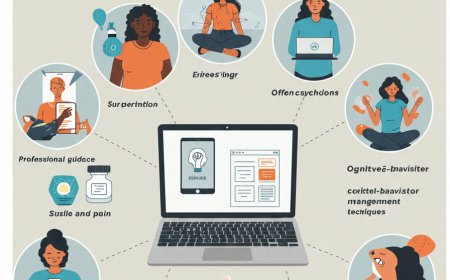Understanding the Binge Eating Cycle: A Mental, Emotional, and Physical Breakdown
Binge eating is when you consume large quantities of food in a short period, often feeling out of control while doing so.

You probably didnt plan to binge. Maybe you just wanted a bite, something to take the edge off after a long, emotionally draining day. But before you know it, youre knee-deep in snacks, comfort food, or takeout, wondering:Whats wrong with me?
The answer?Nothing. Nothing is wrong with you.
What youre experiencing isnt failure or lack of willpower. Itsbinge eatingand theres a psychological reason behind why it keeps happening.
What IsBinge EatingReally?
Binge eating is when you consume large quantities of food in a short period, often feeling out of control while doing so. Its typically followed by guilt, shame, and sometimes physical discomfort.
But the binge itself is just thetip of the iceberg.
Beneath every binge lies a mix of unmet emotional needs, mental stress, and physical deprivation.
To start healing, you have to look at all three:mental, emotional, and physical.
Mental Breakdown: The War Inside Your Head
Lets talk about the inner critic.
The voice in your head that says:
- You already blew itmight as well finish the whole thing.
- Youll never get your eating under control.
- Tomorrow youll be better. Just make up for it.
This type of all-or-nothing thinking fuels binge eating. It creates a pressure cooker: you restrict all day or all week, trying to be good, and then crack under the weight of perfectionism.
This isnt just poor thinkingits a protective mechanism. When youre mentally overwhelmed, food becomes an escape hatch. And the more you try to control food through rules and guilt, the more your brain pushes back.
Emotional Breakdown: Loneliness, Stress, and Shame
Food doesnt just fill your stomachit fillsspace. Emotional space.
When you feel anxious, bored, overwhelmed, lonely, or ashamed, food offers quick comfort. Its immediate. Its reliable. It gives your brain a hit of dopamine and a temporary sense of calm.
Lets look at the most common hidden emotional drivers:
Loneliness
Binge eating often happens in secret. Alone at night. Lights off. TV on. Food becomes company. It takes the edge off the emptiness. But afterward, you feel even more alone.
What youre really hungry for isnt more fooditsconnection.
When life gets chaotic, your brain craves something to ground itself. Bingeing becomes a quick way to shift gears from anxiety to distraction. But it never addresses the source of the stressit just delays it.
Shame
This ones big. Shame says,Youre disgusting.Youll never be good enough.And to avoid feeling that shame, you eat. And then you feel even more ashamed. So you eat more.
Its not about the foodits about numbing what hurts.
Physical Breakdown: Deprivation Leads to Rebound
Heres something most people overlook:binge eating is often your body trying to survive.
When you restrict food during the dayskip meals, avoid carbs, under-eatyour body goes into alarm mode. It thinks theres a famine. And when you finally eat, the hunger hormones are raging.
Your body doesnt just want food. It wantsallthe food. Fast.
You might call it lack of control. But really, its biology doing what its meant to doprotecting you from perceived starvation.
The more you restrict, the stronger the binge response becomes.
Why Diets Make It Worse
Diets are often built on the very patterns that trigger binge eating:
- Labeling foods as good or bad
- Skipping meals to save calories
- Ignoring your hunger cues
- Starting over every Monday
These behaviors disconnect you from your bodys natural wisdom. They teach you to override hunger, suppress cravings, and follow rigid rules. And when your body rebels? You blame yourself.
The truth is:you dont need another diet. You need a different relationship with food.
So How Do You Break the Cycle?
Healing from binge eating doesnt happen through force or willpower. It happens throughunderstanding, consistency, and support.
Heres how you start:
1. Build Awareness Without Judgment
Begin by noticing:
- What triggered the urge to binge?
- Were you physically hungry?
- What emotion were you feeling?
This is wheremindfulnessbecomes your most powerful tool. When you pause and reflect without shaming yourself, you start to break the autopilot response.
2. Use Tools That Support You, Not Shame You
You dont need to white-knuckle your way through recovery. You need tools thatlistento your patterns and gently help you shift them.
Try theEating Enlightenment App
This app is designed for emotional eaters. No calorie counting. No restrictive goals. Just simple daily check-ins to:
- Identify emotional triggers
- Notice thought patterns
- Track binges and breakthroughs with compassion
Its like a mirror that helps you see whats going on underneath.
3. Go Deeper with the Enlighten Eats Course
If you want a structured path to real food freedom, theEnlighten Eats Courseis your next step.
Inside, youll learn how to:
- Stop the restrict-binge cycle
- Understand and manage emotional triggers
- Rebuild trust with hunger and fullness cues
- Practice daily self-care and body awareness
Its not about eating lessits about living more.
4. Get Personalized Support from a Coach Who Understands
Some people need real-time guidance. Someone to talk to when things feel hard. Someone who can reflect your growth back to you and help you make changes that actuallystick.
With1-on-1 coaching, youll get:
- Deep emotional support
- Custom tools based on your unique story
- Accountability and encouragement without pressure
Book Nowto connect with a coach and start making peace with foodone step at a time.
Conclusion: You Are Not the ProblemThe Cycle Is
If youve been stuck in binge eating for months or years, heres what I want you to know:
- Youre not broken.
- You dont need more rules.
- You deserve peace with food.
Binge eating is a coping mechanism. A pattern. And like any pattern, it can be changed.
You just need the right support, the right tools, and most importantlya willingness to meet yourself with compassioninstead of shame.
So if youre ready to step off the binge-restrict hamster wheel and start something different, heres your invitation:
- Download theEating Enlightenment Appto begin tracking your habits with insight and care
- Enroll in theEnlighten Eats Courseto build a new foundation
- OrBook Coachingfor a more personalized journey
No more waiting for the perfect time.
The time is now.
Because freedom from binge eating doesnt start with food.
It starts with you.







































